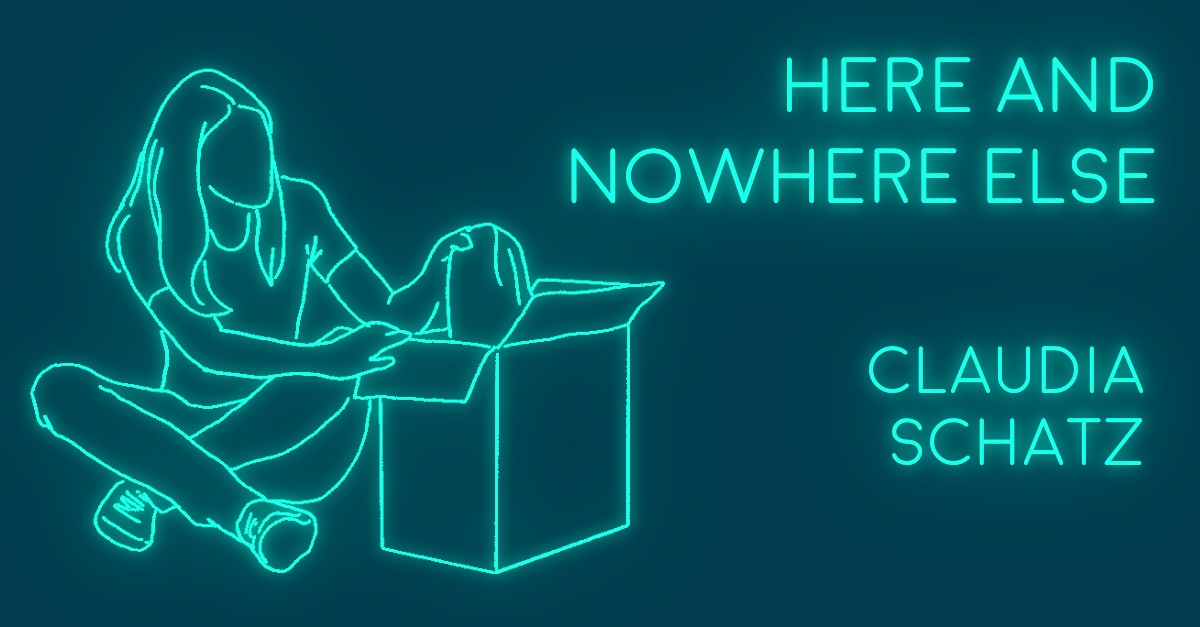They think it’s about the house but the house is just floors and walls and you can find those anywhere. It’s the rest of it, the sounds and smells and sights that tug on my eyelids and earlobes and fingertips, all asking for a home in my mind, and I say yes.
It’s the tire-rush of traffic on the road below my window, the thick jungle of radios in summer when the cars back up at the stoplight. How sometimes a song I know wakes me up in the deep quiet of late night, distorted, pushed one key higher by the car zooming towards the house, then pitched flat and tinny as it flies away. How when it rains I wake up and listen, before I even open my eyes, to how the tires grip the pavement, wait for that wet hiss of a fresh drizzle or the slow splashing of the-drain-is-clogged-again, and that’s how I know if it’s a rainboots day or just a raincoat.
At night, the cars throw their headlights through my windows, sending gridded window-shapes racing around the walls of this room where I’ve always slept, here and nowhere else. The lights make pale sails that glide towards and across and over one another on the old plaster above our beds, and Pip and I used count them before we fell asleep, but we haven’t counted for a long time because Pip moved to the basement bedroom four years ago for high school and now she’s leaving for college, and she doesn’t want to be Pip anymore, she wants to be Penelope.
They decided to sell the house because our four will be three now, and a smaller place makes more sense for three people. I said no, all I ever say anymore is no, even though yes is usually my favorite word. But now, even when I’m not saying anything, I feel my mouth make the no-shape, and my whole body only fits into a no-shaped space, curled in a comma in my bed, and when they come to wake me I remember that it’s late August and we have eight days left here, fewer days than I am years old, and I clench tighter into a period, the punctuation of no.
When at last I uncurl and clunk downstairs, Mom is taping boxes shut in the hallway, sweating, and the packing tape screeches in the muggy air. “Don’t just shove those in there,” she warns Pip, who is stuffing tangles of extension cords into a bag. Pip rolls her eyes and tugs the cords out again with a huff. She’s had her suitcases packed for a week already and is always sighing like we’re making her late. I hear Dad clomping around the kitchen, tugging the vacuum behind him. “Has anyone seen the tape measure?” he calls. “No,” we yell back. Our voices echo against the bare walls. “Can someone help me find it?” “No,” I yell again. Mom looks at me and pushes frizz from her forehead. “I know it’s hard to leave this house,” she starts. Her eyes are shiny. “But–” No. I turn and run back upstairs.
Because it’s not just the house. It’s everything I’ve said yes to. The peonies by the front door, silky petals clenched inside tight green fists that erupt into pink clouds the size of my head, their softness contained in those hard pebbles of waiting. The bushes by the gate whose leaves curl lengthwise so they look like Fruit Roll-ups, which Pip once said they were but they most definitely are not and I would know because I believed her. The dry dust scent of the radiators in November when the heat burns the wings off the wasps that died in the grates during summer. The wide slate slabs of the front steps whose uneven edges we can never clear of snow, their jagged lips catching on our shovels until Dad scatters so much sand that the front hall turns into a winter beach as our boots track grit inside. The broken slat in the fence where Pip and I buried a dead bird with stiff scaly feet and velvet feathers and covered it with a round stone and never told anyone. The staircase with creaks on steps three, four, eight, and ten and how I know whose feet are whose from the way they make the wood talk. The window over the bathroom sink, up high and pointing out, the only window in the whole house where all you see is sky.
When I told Dad that, he said he’d never noticed and I wondered if the view was different from his height, if it wasn’t a perfect square of blue because he could see down into the yard. I didn’t ask, though, because I wanted to see for myself if it would change as I got taller, if the frame would shift and show something new to my up-high eyes. But now I’ll never know because I’ll never be taller here. All this and they still think it’s about the house.
I’ve said so much yes, yes, yes here where we are four, and I’m all filled up, no more room in my head. The house for three will be flat and grey to me and I won’t see anything, I won’t smell its heat or know its shapes because I have to hold this place inside me in case everyone else forgets. Mom and Dad won’t remember; they don’t know what I know, they look out the window and see trees and fences, not pure sky, and even Pip won’t remember because it’s Penelope now, and if she’s forgotten her own name, what else will she lose track of at school? They could forget everything in the rush of the move, forget until our leaving here washes away our living here and it all disappears, no rolling over yes, headlights fading from plaster.

